In February of 1950, the Legislative Assembly of Prince Edward Island passed An Act to Enable the Inhabitants of Certain Villages to Supply Themselves with Certain Services.
The first two villages to put forward the notion of incorporating under this Act were Crapaud and Parkdale; Crapaud’s rationale was described in The History of Crapaud:
Villages, in common with larger centers, have their own peculiar problems. One of ours was to equip and maintain an A.R.P. Fire-fighting unit, which we received early in the Second War, and which was badly in need of additional hose. This was done at first by voluntary contribution, but, as time passed, and costs increased, it seemed unfair that a few should bear the burden of expense, when all received the same service.
And so, as a means of working out a solution to our problem, a meeting was called in the Office of the Crapaud Creamery Co. on April 1, 1950. Those present were: B. C. Wood, R. N. Dawson, Parker Canfield, Ralph Myers, L. H. Rogerson, Earl Maynard, W. M. Waddell, John Leard, LeRoy Howatt, John Nicholson, George Wotton, John Simmons and A. P. Simmons.
The meeting immediately got down to business. On motion, B. C. Wood was appointed Chairman, and George Wotton, Sec’y. Mr. Wood stated that the purpose of our meeting was to discuss the possibility or desirability of having the Village of Crapaud incorporated under the Village Service Act, which Act had been passed at the last session of the Provincial Legislative Assembly.
After a good deal of discussion, the Sec’y was instructed to write the Attorney General, Hon. Walter E. Darby, and obtain copies of the Village Service Act, which Act would be thoroughly discussed at our next meeting. Several copies of the Act arrived on April 5.
A meeting was called for April 10, at 8 p.m. The above mentioned gentlemen were again present. After reviewing events thus far, the Chairman circulated copies of the Act, read certain sections, and finally asked all in turn to stand and speak for, or against. One man was fearful lest we be compelled to maintain our public road in the Incorporated area; another felt we should move cautiously; all the rest were quite enthusiastic, and wanted to proceed at once. Eventually, all signified their willingness to petition the Sheriff of Queens County, John L. Beaton, to conduct a Plebiscite to determine the wishes of the majority of the residents in this respect. It was further decided that the incorporated area should include all land and water within a half mile radius of Crapaud Bridge, which spans the Westmoreland River, on the present course of Highway Route No. 9. This petition was prepared and duly signed by a large number of qualified citizens, greatly in excess of the required number of twenty-five.
(This is the first mention I’ve found in the printed record of a decision to form incorporated Crapaud with round boundaries — see background here).
The nature of the plebiscite was laid out in a lovely blue broadside, a copy of which I found in the Public Archives:
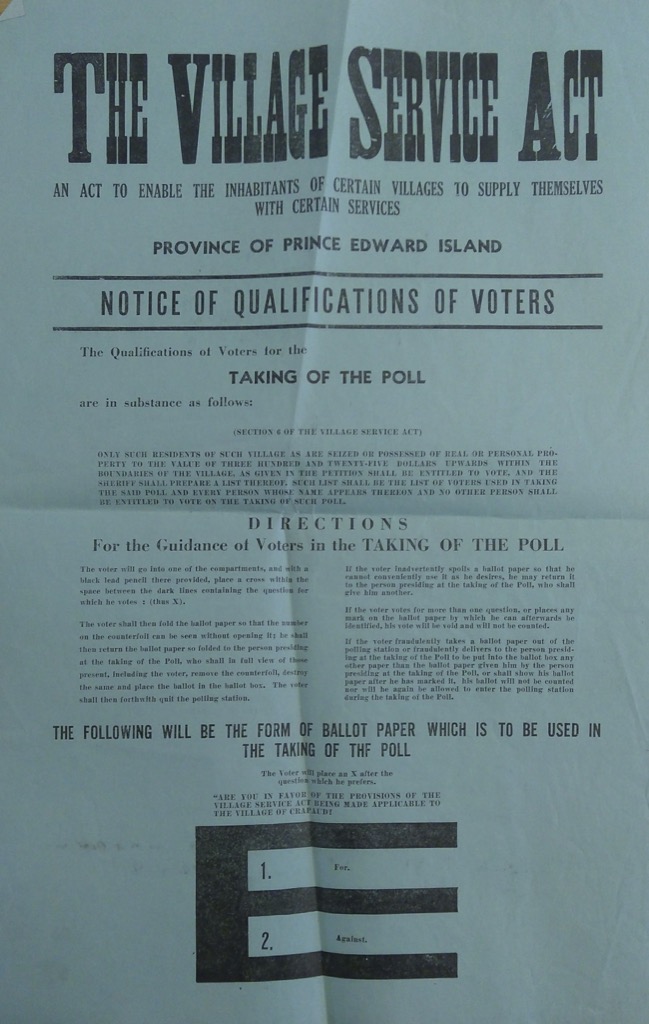
Public Archives and Records Office of Prince Edward Island
RG6.1: Supreme Court fonds. Series5: Case files, 1930-1959
Item number RG6.1/s5/ss3/6972
Reproduced with Permission
On May 22, 1950 the citizens of Crapaud held their plebiscite on the issue: The Guardian reported that 45 people voted “for,” and 36 “against” (there were 170 inhabitants of Crapaud at the time, reported the government the following year, so the voter turnout was around 46%).
The result of the plebiscite was almost immediately called into question; in the May 30 edition of The Guardian, a writer with pen name of “A Voice from the People” wrote:
Sir. — It is felt by many of the good people of Crapaud that the Government of this Province was very ill-advised in introducing at their last session an Act governing the incorporation of small villages. If it was the intention of the Government, in introducing this legislation, to promote discord and dissension in these villages, then their objective has certainly been fully met as far as Crapaud is concerned. We hear much these days of a “cold war”. A war is fast developing here in Crapaud, that promises to be anything but cold, over the result of the recent plebiscite. Some fear the introduction of this Act so keenly they are already planning if and when it becomes operative here to dispose of their property and move out. It is felt by many the thing for Crapaud, particularly for those in the lower income brackets. Future generations, it is thought will note this date of May 22, 1950, as the date that marked the beginning of the decline of Crapaud. Prospective home seekers and home builders will avoid this place as they would a plague because of a steadily mounting spiral of taxation that inevitably follows the incorporation of any small place.
In regard to the election itself which was carried out on May 22 a full and careful investigation would seem to be indicated. It is alleged that the list of names sent the Sheriff and on which he based his decision to call this election contained names of persons living quite outside this electoral zone. It is thought if this proves to be correct the election should be declared void on this count alone. The publication of this list would at once clear up this point.
It is further alleged that only persons known to favor this incorporation scheme were chosen as scrutineers, the negative side of the issue being unrepresented.
It is also alleged that persons known to favor incorporation and who were quite ineligible to vote were allowed to do so. In fact the whole affair seems to have left behind an unsavory odor.
It should be clearly understood, however, that in none of these things was the Sheriff in any way to blame, as far as he was able to judge everything being correctly done.
I am, Sir, etc.,
A VOICE FROM THE PEOPLE
Crapaud, P.E.I.(With regard to the above complaints, Sheriff Beaton states (1) that the list of names submitted on which he based his decision to call the election, did not contain the names of any persons living outside the electoral zone; (2) that the scrutineers were appointed at a duly called meeting of the community, and (3) that anyone with personal property of the value of $325 was entitled to vote. —Ed. G.)
By June 26, 1950, the paper reported, the Provincial Government opted to refer the matter to the Supreme Court for a consideration, Executive Council having set aside “a sum not exceeding Three hundred dollars” as counsel fee on June 8, 1950:
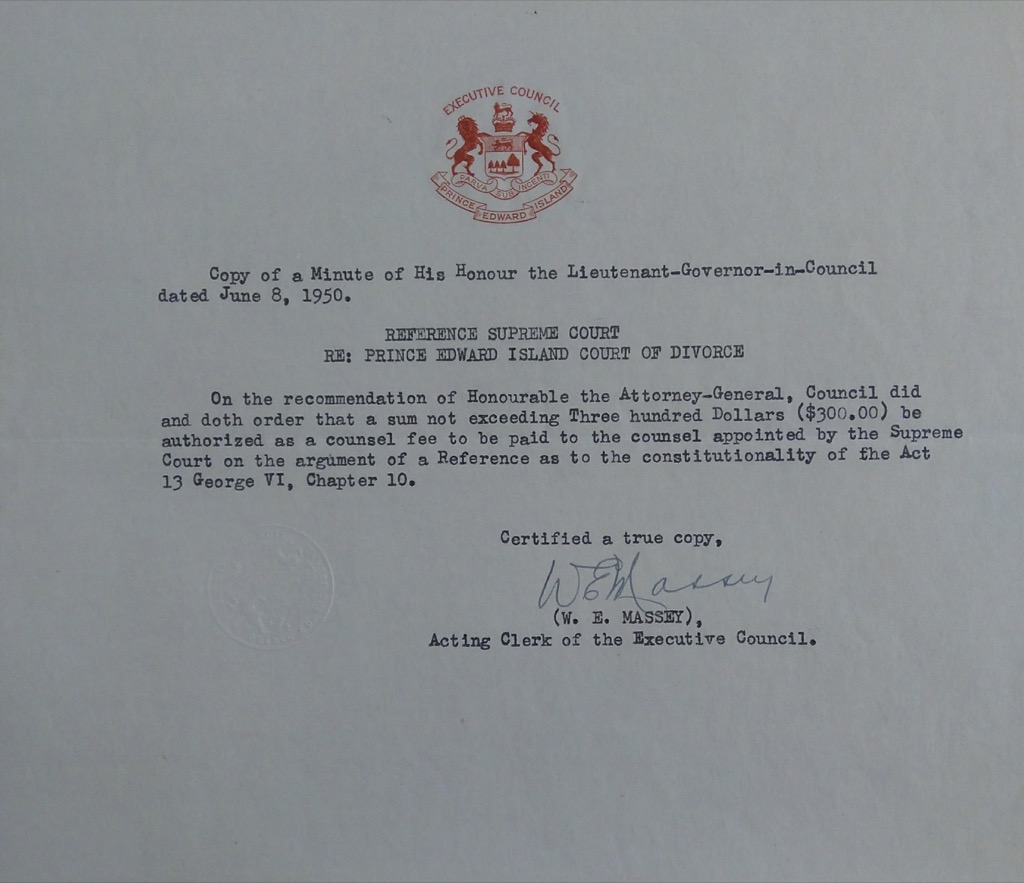
Public Archives and Records Office of Prince Edward Island
RG6.1: Supreme Court fonds. Series5: Case files, 1930-1959
Item number RG6.1/s5/ss3/6972
Reproduced with Permission
The court reference itself asked the “Supreme Court in banco of the Province of Prince Edward Island for hearing and consideration,” as follows (PDF):
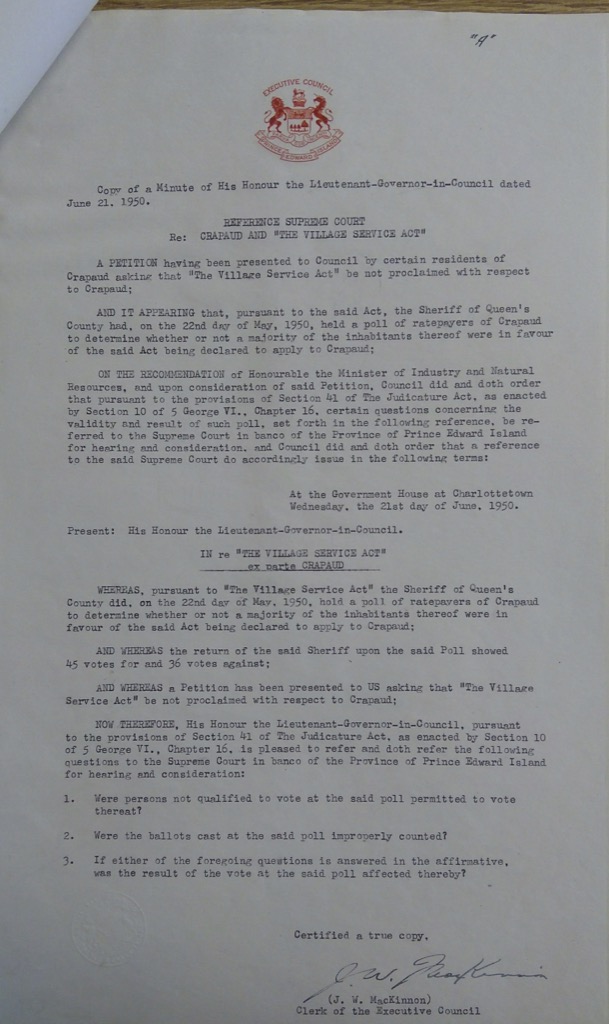
Public Archives and Records Office of Prince Edward Island
RG6.1: Supreme Court fonds. Series5: Case files, 1930-1959
Item number RG6.1/s5/ss3/6972
Reproduced with Permission
In the file in the Public Archives that contains items related to the reference are samples of the ballots used in the plebiscite, including this spoiled one, marked both yes and no:
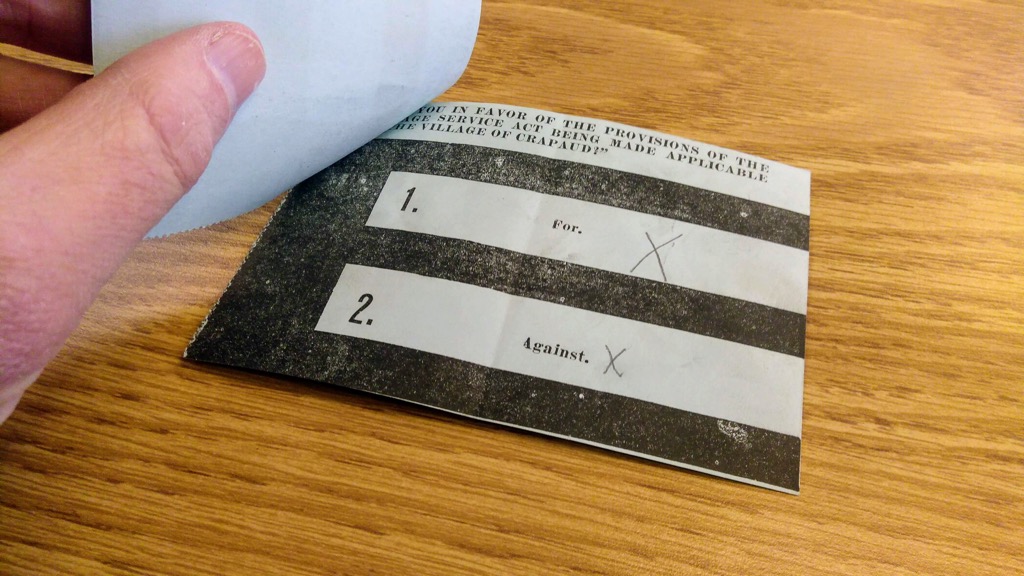
Public Archives and Records Office of Prince Edward Island
RG6.1: Supreme Court fonds. Series5: Case files, 1930-1959
Item number RG6.1/s5/ss3/6972
Reproduced with Permission
The court sat on July 14, 1950, and its decision ran under the headline “Result Of Crapaud Plebiscite Confirmed” in the July 15, 1950 newspaper, on the front page:
The full bench of the Supreme Court yesterday confirmed the result of the Crapaud plebiscite under the Village Service Act. The opinion of the Court was read by Mr. Justice M. R. MacGuigan. The questions referred by Order-in-Council June 21, 1950, were:
1. Were persons not qualified to vote at the said poll permitted to vote thereof?
2. Were the ballots cast at the said poll improperly counted?
3. If either of the foregoing questions is answered in the affirmative, was the result of the vote at the said poll affected thereby?
Having heard submissions of counsel. Mr. J. O. C. Campbell. K. C., for the Crown and Mr. K. M. Martin, K.C., for the opposing interests. The Court answered the questions as follows:
1. Yes. One, or at most two. persons not qualified were permitted to vote.
2 Yes. A reported result of the poll was 45 affirmative and 36 negative votes, and ten rejected ballots. Of those ten, three were properly rejected and the other seven should have been counted. Of the seven, one was marked in favour of the provisions of “The Village Service Act” being made applicable to the village of Crapaud, and the other six were marked against.
3. No. If all the improperly rejected ballots had been counted and all unqualified voters had been rejected, there would have remained a majority of at least two and possibly as many as six votes for the affirmative.
Appeal Dismissed.
J.D. Lord was a fierce opponent of the notion of incorporation, and The Guardian of July 20, 1950 ran an opinion piece by him that had been held until the plebiscite question had been ruled on by the court:
Sir, — After the severe scorching we received from Mr. Wotton in a recent issue of The Guardian we have finally screwed up our courage sufficiently to enable us to come forward and utter a feeble little chirp.
Since coming to live in Crapaud a few months ago we have attended strictly to our own business, leaving other people quite free to attend to theirs. However, when irresponsible agitators get loose in a village and start advocating anything as insane as the incorporation of a small place like Crapaud that is bound to involve the people in more and more taxation, this too is our business as it is the business of every property owner in Crapaud. Incorporation involves taxation. Taxation follows incorporation just as surely and as naturally as the night follows the day. The opposition that has developed and is still developing to this incorporation scheme appears to be a spontaneous uprising of a large number of the more thoughtful people of this community who are becoming aware of the danger that lie ahead.
We fully agree with the necessity of keeping the fire fighting equipment of this place in good order. The hose was ruined before I came here, having been used for other purposes than fire fighting. We were told. and by one of Mr. Wotton’s henchmen, that the old worn-out hose was not renewed because the committee in charge attempted to levy an unfair tax of $10 a head on the people irrespective of size of income. If our opposition to this incorporation scheme has disrupted the whole fire fighting system of Crapaud and disturbed the peace and tranquility of this place as charged by Mr. Wotton, we feel it would be equally absurd to charge the people of South Korea with the trouble there. On the contrary, as recently as last Saturday we saw the Crapaud fire fighting equipment doing servlce at a barn fire in Victoria.
It seems to me a most extraordinary situation to incorporate a small village in order to purchase a short piece of fire hose. Nor do we think it necessary to incorporate in order that all may share fairly in the necessary village expenses. We do not agree either that a committee appointed to look after this work would necessarily prove more efficient under incorporation.
We are greatly surprised at the type of men here who have fallen for this thing, particularly the farmers on whom this will bear most heavily. We are not greatly disturbed about the immediate future. The alarming thing we see about it is that once incorporated it is in perpetuity. As far as we know there is no way out.
Now in regard to light. If there is one thing more than any other that Mr. Wotton needs it is light. We think the merchants or other business men of this village in their own interests might install some outside lights. This added to the present number of private lights we think would take care of that situation quite nicely without incorporation.
The remedy for the congestion of traffic that Mr. Wotton complains of here lies we think with the parties who benefit by this influx of people. We feel there could be no objection to Mr. Wotton’s generous friends who are willing to supply free parking space if and when this place is incorporated, doing so without incorporation. We think Mr. Wotton responsible in quite a measure for this congestion of traffic. There is little doubt that a large number of people come in here to Crapaud on Saturday nights for the express purpose of getting a peep at him.
“The more they gazed the more the wonder grew
That one small head could carry all he knew.”Mr. Wotton makes much of the fact that we are incorporated under the Village Service Act, not like the poor people of Kensington and Borden who are under the ordinary Town Act. It is true that under the governing act here there is a protecting clause that makes it necessary for the citizens to vote funds before any money can be expended. Mr. Wotton knows, but failed to point out in his letter, that at a public meeting held here in Crapaud the Hon. Mr. Cullen in answer to a question by myself admitted the possibility of the deletion of this clause if the commissioners desired more money than the citizens were willing to vote. Remove this protecting clause from the Act and you have left exactly the same Act that Mr. Wotton bemoans the Poor people of Kensington and Borden to be suffering under.
The governing Act here is copied from a Nova Scotia Act. I am enclosing a brief clipping from in Nova Scotia weekly paper dated March 23, 1950. which deals with the situation in a small incorporated town in that Province, and which reads as follows:
“At a special meeting of the Town Council, held Monday, the tax rate for the year 1950 was struck at $6.25 per $100.00 of assessment. This is a reduction of .25 over the 1949 rate. which was $6.50 per $100.00 assessment.”
This same little paper through the many years we have taken it has frequently given comparative tax rates of other small incorporated towns in the Province. The story with all of them is very similar. This small Nova Scotia town contains at least three or four times as many people as we have here in Crapaud. With three or four times fewer people, with this protective clause removed, and over a like period of time we think it a fair assumption that the taxes here could quite easily be three or four times greater than those in that town.
These taxes are comparable to a rolling snowball. The further it goes the larger it gets. And the larger it gets the faster it goes. We would very much dislike to see the children of Crapaud left a legacy of an abomination of heavy or uncontrollable taxation.
The 50 cents a head Mr. Wotton seems so perturbed about losing will be paid by the Government, if at all, only after the people of Crapaud have contributed of their own funds towards certain services.
There is another item we feel I sure has not been overlooked by Mr. Wotton although he neglected to mention it in his letter. This is the salary that is attached to the office of secretary of the Commissioners when appointed. This money if spent for the purchase of fire fighting equipment we think would be much more profitably used.
There is a very strong tendency for matters of this sort to fall into the hands of a certain class of people who are much more progressive than wise when it comes to the expenditure of funds that belong to other people.
Mr. Wotton was certainly unfortunate in his choice of a simile when he likened the people of Crapaud who failed to agree with him to drones in the hive. We are sure your readers, and particularly the ones living in Crapaud, will not fail to appreciate the humor of this coming from Mr. Wotton.
We would warn residents of other small villages in this Province against rushing into this incorporation scheme unadvisedly as has been done here in Crapaud.
“If in doubt don’t do it.” Beware of glib tongued agitators. Especially avoid any who have nothing of a useful nature to occupy their time; masquerading under a cloak of patriotism and good citizenship, and with probably an axe of their own to grind.
We think sufficient has now been said to fully clarify the issue. We will not willingly enter Into a prolonged controversy with any one.
We wish to thank you, Sir, for your courtesy in allowing us space to express our views in your valuable paper.
I am, Sir, etc.,
J.D. LORD
Crapaud, P.E.I.(This letter was received some time ago but was withheld pending the Supreme Court decision in the matter of the Crapaud plebiscite. — Ed. G)
Less than two weeks later, on July 29, 1950, the incorporation of Crapaud was proclaimed.
The History of Crapaud reports that, at the first meeting of the newly-incorporated village on August 14, 1950, fire equipment was, as Mr. Lord referenced, a focus of discussion:
A special meeting was called for August 14, at 8 p.m. The purpose of this meeting was to discuss, and possibly take immediate action on, the re-organizing of our Fire-fighting force equipment, maintenance, Street lighting, by-laws, etc. A short discussion indicated a desire to maintain an active Fire-fighting force. A motion by John Nicholson, seconded by Wilmot MacDonald, that we re-organize our Fire-fighting force, was carried unanimously. Fire Chief, Robert Dawson; Asst. Chief, A. P. Simmons; Fireman, L. H. Rogerson, Elmer MacDonald, John Leard, Wendell Mayhew, B. C. Wood, Parker Canfield, Clayton Crosby, Nelson Molyneaux, Eric Butler, W. M. Waddell, Maurice Cudmore, and John Luque.
B. C. Wood reported that he and George Wotton had moved the fire hose to the boiler room in the Factory and, on checking it over, had found that three lengths were defective beyond use; that the usable hose on hand consisted of 12 lengths of used hose, and 10 lengths of new hose, each about 50 ft. long, which when coupled together, would extend 1100 ft. It was also thought advisable to buy additional hose, and, on motion by John Simmons, and carried, $100. was voted for this purpose. The Chairman reminded the meeting that the Government made a yearly grant to the Village equal to .50 cents per man, woman and child, within the area, and that this, in our case, would amount to $75. or $80.
The first Annual Meeting of the incorporated Village of Crapaud was on February 1, 1951. The budget for the year included $258.01 in taxes collected, and a government grant of $86.50.
Expenses for the year: $180.56 for lights.
And $220.06 to the Dunlop Fire Co. for fire hose.
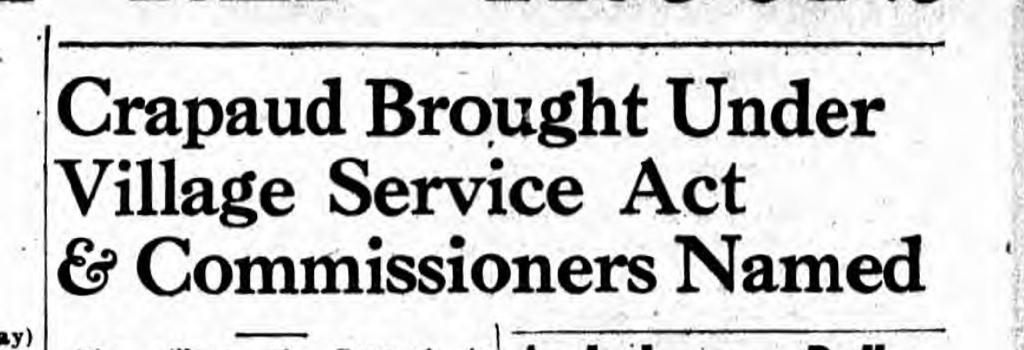
 I am
I am
Comments
Off topic of Crapaud, but a
Off topic of Crapaud, but a piece from history raised a question around a recent concern on PEI - could the citizens of PEI petition the court to review the results of a plebiscite, and give government a clear direction?
For a moment there, I thought
For a moment there, I thought you were going to describe Crapaud was round, because it was the circle the fire hose to be acquired had as radius of action. But then you mentioned the circle has a radius of half a mile, and I realized this was not because of the 'short piece' of fire hose you mentioned :)
1250 feet of hose. 1/4 mile.
1250 feet of hose. 1/4 mile. Very funny. Politics was clearly a blood sport. I love the quote "“The more they gazed the more the wonder grew
That one small head could carry all he knew.”
Add new comment